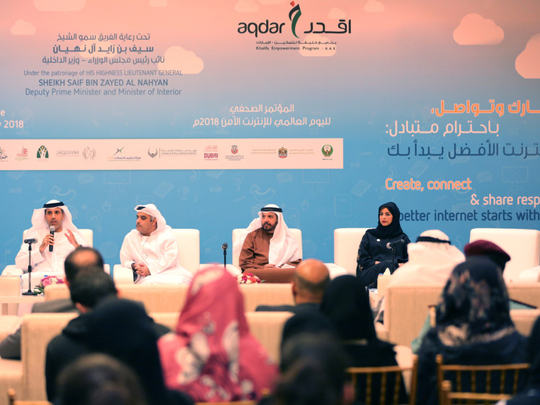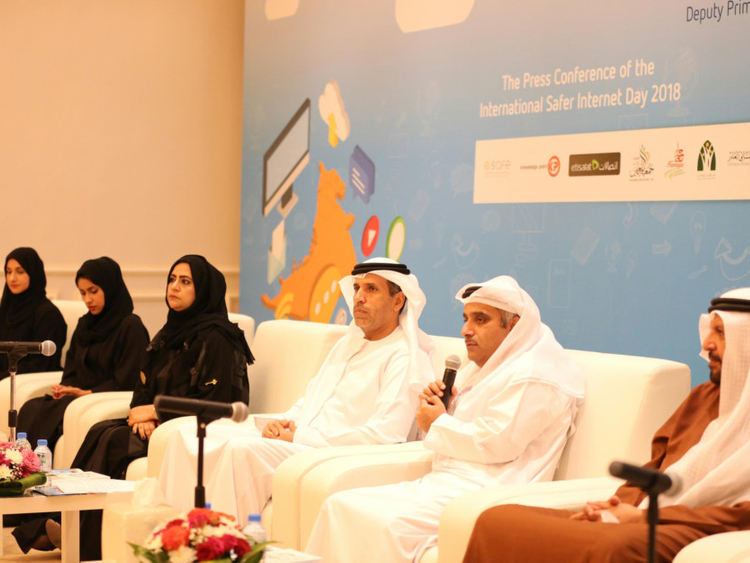
Abu Dhabi: Irresponsible internet use may land you in jail under the cybercrime rules of the country and invite a fine of Dh1 million, according to the Ministry of Interior.
And those who are found engaging in triggering the destructive radical ideology that contradicts religion, culture and the country’s values may be imprisoned for five years and fined up to Dh2 million.
Spreading rumours, cyber-bullying, promoting radicalisation on the internet and spreading destructive ideology among youth were attributed to be the major challenges of the day.
The Ministry of Interior (MoI), along with a number of government entities including General Women’s Union, Ministry of Education, Department of Education and Knowledge, Etisalat, Telecommunication Regulatory Authority, Government of Dubai, Teachers Association-UAE and Emirates Safer Internet Society (e-Safe) organised a press conference on Monday to mark “Safer Internet Day 2018”.
They also initiated a year-long safer internet usage awareness drive among youth, “Be The Change, Communicate Responsibly”.
Speaking to Gulf News, Brigadier Dr Salah Al Ghol, Head of the Law, Respect and Culture Office at the MoI, said: “The Ministry of Interior can’t fight the internet challenges alone, we need support from all entities and sections of the society. We have a team at the MoI which follows such kinds of internet crimes.”
“All government and private entities will have to collaborate to spread the awareness of internet usage and its challenges in the country. However, all these entities will highlight the threats and challenges posed by extremist forces and destructive ideologies posed to youngsters,” Brigadier Al Ghol said.
“In order to combat the groups of extremist and terrorist forces [on the internet] and to protect the society and enhance its betterment, we have a unit that keeps a tab on cybercrimes,” he said.
Brigadier Dr Ebrahim Addabal, Coordinator General for Aqdar programmes, said, “Mostly internet users are between the age group of 14 and 18, and they could be exploited for different purposes by extremist forces and people so we need to make them aware about the dangers and educate them about the precautionary measures.”
He asserted that parents should keep a tab on them and educate them.
Under the patronage of Lieutenant General Shaikh Saif Bin Zayed Al Nahyan, Deputy Prime Minister and Minister of Interior, the event was organised by Aqdar, Khalifa Empowerment Programme UAE.
Blocking trolls
Gulf News spoke with students who said they were at least once approached by an unknown person online.
Saba Wajdi, 16, from Al Dhabiania Private School in Abu Dhabi, said, “An unknown person intruded into my account and wanted to chat with me so I informed my mother and she told me to immediately block him, which I did.”
“I only chat with the known relatives and friends. We should have fun on the internet playing games but should exercise caution and if an unknown person tries to interact with us we should block him,” said Wajdi, who spends three hours on the internet in a day. She is in Grade 10.
Another student from the same school, 15-year-old Omayma Jaber, said: “Just last week, some unknown person wanted to chat with me on Instagram and showed his interest in my drawings. I told him, I don’t know you so don’t ask me about my drawings. Then I blocked him,” Jaber said. She added that although the internet had its benefits, at the same time, it could be a dangerous space.
Grade 10 student Sara Mohammad, 15, from Aishah Bint Abi Baker School in the capital, said, “I spend five hours a day on the internet and I never interact with strangers and if some intruder flashes up on my private account’s screen I immediately block him.”








